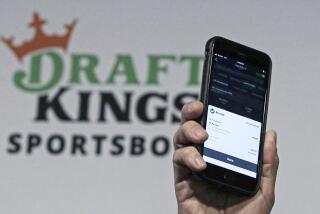NFL Players Seek an Injunction Against Drug Testing
- Share via
WASHINGTON — The National Football League Players Assn. filed suit in U.S. District Court Wednesday to block the NFL from implementing its new random drug-testing program.
In the lawsuit, the union is seeking a temporary restraining order and preliminary injunction prohibiting the implementation of the program announced Monday by NFL Commissioner Pete Rozelle, pending arbitration.
In addition, the union asked the court to order the two parties to arbitrate the dispute on an expedited basis “so as to obtain a final and binding arbitral award, if practicable, within 30 days” of the issuance of the preliminary injunction.
The players also asked the court to prohibit the league or the individual teams from “initiating any disciplinary action or attempting to discipline any player . . . who has objected to or questioned or refused to participate in any activity required by said policy.”
In its complaint, the union said: “If implementation of the new program is not stayed pending arbitration, (the players) will be subjected to unwarranted invasions of privacy and exposed to threats to their professional reputations and skills--harms which an arbitrator could not subsequently remedy.
“The balance of hardships strongly favors (the players), as does federal labor policy,” the association said.
Rozelle said in New York that he believes the arbitrator will endorse his right to order random drug testing.
“I feel that an arbitrator might feel that I could do what I did,” Rozelle said.
The union filed a grievance through its collective bargaining procedure against the NFL Management Council Tuesday, saying it would not allow Rozelle’s new drug plan to be “shoved down our throats.”
Rozelle said, however: “I have the right to do what I did for the sake of the health and welfare of the players (and) to preserve the integrity and public confidence in the NFL.”
The council said it would study the grievance and respond within seven days as specified in the collective bargaining procedure. The union had asked for a reply within 24 hours.
Under the Rozelle plan, a player testing positive for drugs would be put under continual supervision for 30 days, then suspended for at least 30 days at half-pay if tested positive again, and would be permanently banned with right of appeal if he fails the test the third time.
Rozelle’s plan would also add two random drug tests to the mandatory preseason urinalysis agreed to in the 1982 collective bargaining agreement, which expires after the 1986 season. The current agreement allows a urinalysis during the season if there is suspicion of drug use.
More to Read
Go beyond the scoreboard
Get the latest on L.A.'s teams in the daily Sports Report newsletter.
You may occasionally receive promotional content from the Los Angeles Times.









